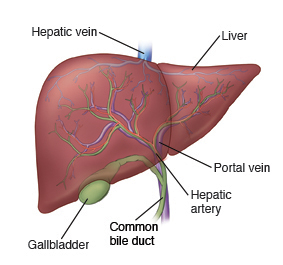You have been diagnosed with hepatitis type A. Hepatitis is an inflammation of the liver. In your case, it is from an infection with the hepatitis A virus (HAV).
Causes
The most common causes of hepatitis are viruses. Alcohol and drug abuse, chemical toxins, food contaminated with feces, and autoimmune disorders can also cause hepatitis. So can diabetes, obesity, and metabolic syndrome.
When a virus causes hepatitis, it is called viral hepatitis. The hepatitis viruses A, B, and C commonly cause viral hepatitis. Other viral infections can also cause hepatitis, such as the viruses that cause mononucleosis and chicken pox.
All the hepatic (liver) viruses have one thing in common. That is, once they are spread to you, they infect the liver and then cause inflammation (hepatitis). The viruses are spread in different ways. Unlike hepatitis B and C, hepatitis A does not become chronic. It almost always goes away without long-term liver damage. Once it does, you will be immune.
HAV is very contagious. It is mostly spread when you eat or drink food or water contaminated with the feces (bowel movement) of someone who is infected. It is more common in developing countries. But infection with hepatitis A can happen anywhere.
You are more likely to get hepatitis A by:
-
Not washing hands, or not washing hands thoroughly
-
Being in a place with poor sanitation (improper handling of human waste or sewage)
-
Not having safe water
-
Injecting drugs
-
Living in a household with an infected person
-
Being a sexual partner of someone with an acute hepatitis A infection
-
Traveling to high-risk areas without being immunized
Symptoms
Symptoms of HAV often start 2 to 4 weeks after exposure. They are more common and severe in adults. Young children often have no symptoms. When symptoms occur, they can range from very mild to severe. They can include:
-
Tiredness, fatigue, or weakness
-
Low-grade fever
-
Loss of appetite
-
Nausea, vomiting, or upset stomach
-
Abdominal pain
-
Dark yellow-colored urine
-
Light-colored or pale stool (gray or clay color)
-
Yellow color of the skin or eyes (jaundice)
Symptoms of hepatitis A often go away in less than 2 months. But they can last longer. Hepatitis A does not cause a chronic infection like hepatitis B and C.
Home care
-
A diet low in saturated fats and high in fruits and vegetables is best for you and your liver. Have small, frequent meals if you have nausea.
-
If you are having symptoms of hepatitis, you may tire easily. Get plenty of rest. Don't exert yourself too much.
-
Acetaminophen and anti-inflammatory drugs such as ibuprofen and naproxen can be toxic to the liver in high doses, with prolonged use, or in the presence of existing liver damage.
-
If you have hepatitis, don't take these medicines until you talk with your healthcare provider.
-
If you have only mild or no liver damage from chronic hepatitis, you may take acetaminophen in low doses (2 grams per 24 hours). Ask your provider about anti-inflammatory medicines. Never take acetaminophen with alcohol. This increases the risk of liver damage.
-
-
Alcohol stresses the liver. Do not drink alcohol if you have hepatitis.
Preventing the spread of hepatitis
-
This virus is present in stool. So always wash your hands after using the bathroom and before touching any food.
-
Parents caring for a baby with hepatitis should use disposable diapers and wash their hands after changing a diaper.
-
Household surfaces should be cleaned with a solution of bleach. Dilute this by using 1 part bleach to 100 parts water. For example, add 1 tablespoon of bleach to 100 tablespoons—or about 1½ quarts—of water.
-
If you need medical or dental care, tell your healthcare providers that you have hepatitis A.
-
Food service workers should not work until cleared by their healthcare provider.
-
Yellow color of the skin or eyes (jaundice) appears in many people with this illness. It marks the end of the contagious period.
-
People who live with you should contact their healthcare providers or the local public health department as soon as possible. This is so they can be tested and get immunized. A vaccine can be given up to 2 weeks after a person is exposed.
Follow-up care
Follow up with your healthcare provider, or as advised.
If other tests such as an MRI, a CT scan, or an ultrasound were done, they will be reviewed by your provider. Contact them for results.
Call 911
Call
-
Trouble breathing or swallowing, wheezing
-
Confusion
-
Extreme drowsiness or trouble waking up
-
Fainting or loss of consciousness
-
Rapid heart rate
-
Vomiting blood or major rectal bleeding
When to seek medical advice
Call your healthcare provider right away if any of these occur:
-
Frequent vomiting
-
Weight loss from poor appetite
-
Increase in abdominal pain or swelling
-
Increasing drowsiness or confusion
-
Weakness or dizziness
-
New or increasing yellow color of skin or eyes
-
Bleeding from the gums or nose, or easy bruising


